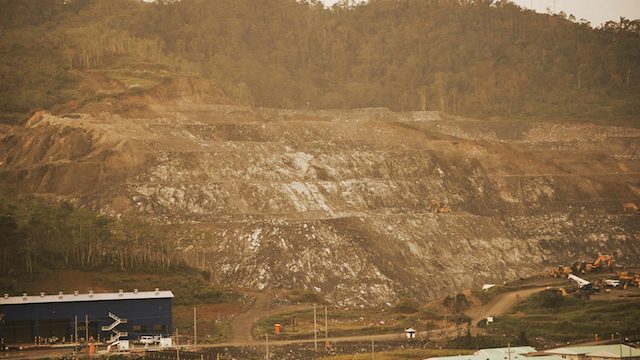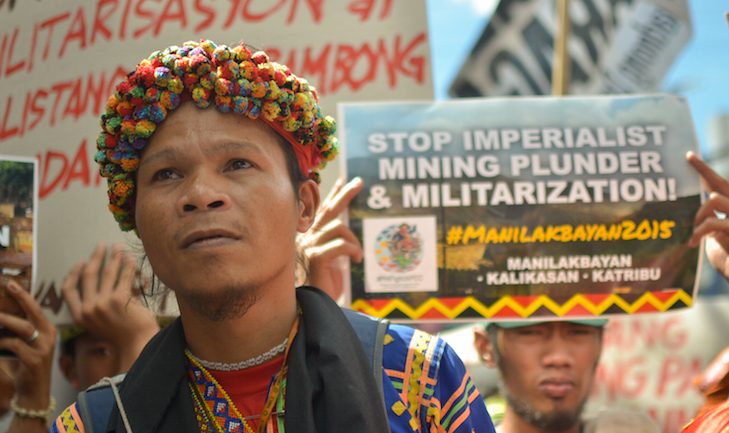SUMMARY
This is AI generated summarization, which may have errors. For context, always refer to the full article.

Various heads of state will be gracing the Economic Leaders’ Meeting of the Asia-Pacific Economic Cooperation (APEC) forum on November 18 in Manila; and it just might seal the fate of the worsening global climate crisis long before the COP 21 climate talks begin.
No exaggerations there. The APEC, after all, is an economic forum of 21 Asia-Pacific economies that represent 70% of global mining production and consumption, 60% of world energy demand, and 60% of the world’s gross domestic product.
Clearly, the economic, social, and environmental thrusts of the APEC are pivotal to the entire world.
Let’s put that into perspective: what if 70% of all mining operations in the world cleared away old-growth forests, strip away fertile agricultural lands, and militarize indigenous communities in the process? What if they indiscriminately dump their waste into adjoining rivers, where people get their water for drinking, irrigation, and fishing? (READ: Mining in Surigao del Sur: Soil of life, soil of death)
What if 60% of the world’s power producers poured the majority of its investments into dirt-cheap but climate-disruptive coal energy? What if the token clean and renewable energy projects they financed actually cut into forest parks, depleted or monopolized water reserves, and are used to grab disputed peasant lands?
What if 60% of the global GDP did not actually trickle down to the destitute majority of the 3 billion people living in the APEC states? Would they be able to withstand the worsening increasingly frequent, powerful, and unpredictable typhoons and other climate change impacts amid the landlessness, poverty, and human rights violations?
Plunder and pollution
These are no mere speculations. These are facets of Philippine reality after decades of adopting various “APEC-branded” globalization policies.
At the start of the new millennium, there were 282 approved mining applications in the country. This has increased three times over by 2014, covering a vast 869,292 hectares of mineralized land in the country.

Through the Mining Act, large-scale mining companies are given various investment incentives such as tax holidays, full capital repatriation, and auxiliary rights such as full discretion over timber, water bodies, and even communities found within their tenements. (READ: TIMELINE: Philippine mining laws and policies)
Meanwhile, the energy industry has seen a 348% surge in the generating capacity of thermal coal projects in the same time period. With the state prohibited by the Electric Power Industry Reform Act (EPIRA) from constructing its own power projects, private power firms have prioritized coal power for profitability despite its environmental and health costs.
Alarmingly, coal is the biggest chunk of our current power with a generating capacity of 32%, and an even larger chunk of power projects in the pipeline at 62%.
Big dam projects in Ifugao, Tarlac, Rizal-Quezon, Iloilo, and Bukidnon-North Cotabato are threatening to massively divert river systems and submerge forests and communities. Solar farms in Cebu and Ilocos Norte will cut over a thousand trees.
In a clear act of greenwashing, solar plants will rise over land-grabbed peasant areas in the Clark Green City in Pampanga, and in the infamous Hacienda Luisita in Tarlac.
Are APEC solutions sustainable, resilient?
How do you reconcile such realities to APEC’s particular pillar theme of ‘building sustainable and resilient communities’?
Consider this: 4 of the 5 most destructive typhoons recorded in Philippine history occurred in the past 7 years, leaving over P185 billion of damage.
On one hand, it speaks of a clearly changed climate. On the other, it reveals how the Filipino people are left vastly unprepared, their government criminally negligent.
The 2012 Philex mining disaster in Padcal, Benguet, the worst in the country’s history with 20 million metric tons of waste spilling into a long stretch of rivers, had the company simply paying measly fines to government. Philex has done little or nothing to compensate for the ecological destruction and the affected livelihoods of various downstream communities.
The 2013 Super Typhoon Yolanda (international name Haiyan) resulted in at least 6,000 deaths and displaced about 4 million people. Injustices such as corruption over emergency shelter assistance funds, and displacement through no-dwelling zones, and profit-oriented ‘rehabilitation’ infrastructure, continue to be inflicted upon the survivors two years after.
A world in crisis, a world to win
The running consensus in the APEC, however, is that we need ‘more business as usual.’ A new APEC fund to promote mining liberalization policies across its 21 member economies has already been opened prior to the leaders’ summit.
The prescription to the energy crisis is the further removal of tariffs on ‘green’ technologies, not even touching the core problem of lacking state regulation.
The worst to expect is actually on the sidelines of the APEC summit. The agenda within the agenda, after all, is to clinch the Trans-Pacific Partnership— the world’s largest corporate power grab that you have never heard of. (READ: APEC 2015: Where PH stands in the Trans-Pacific Partnership)
Secretly negotiated by 12 countries including APEC members such as the United States, the TPP aims to establish a globalization corridor in the Asia-Pacific, where environmental, social, and economic safeguards are eroded, and where trade tribunals allow corporations to sue governments that get in the way of their profits. The Philippines is dead set to join the TPP.
If TPP and the APEC agenda at large will push through, we will see more forest fires causing haze in Indonesia to create room for more palm oil plantations. We will see unabated transboundary waste from Canada and Japan to third world dump sites. We will see destructive fracking operations and open-pit mines pushing through across the entire Asia-Pacific region.

The APEC will clearly put the world in further crisis. This is why 700 indigenous Lumad people and their supporters took the Manilakbayan journey northwards. This is why about 800 farmers, indigenous peoples, and activists will travel southwards to meet the Lumad in a march dubbed ‘Martsa Amianan’.
This is why the North and South will converge with more than 10,000 protesters, including 350 international delegates from the International League of Peoples’ Struggle (ILPS), and will march under the banner of the People’s Campaign against APEC and Imperialist Globalization.
We will speak truth to power outside the halls of the APEC. They have set upon us barricades, barbed wire, and thousands of police forces, but we will not be deterred. Our future is at stake. We won’t wait for the COP 21. We have a world to win. – Rappler.com
Leon Dulce is the campaign coordinator of the Kalikasan People’s Network for the Environment, a member of the People’s Campaign against the APEC and Imperialist Globalization (PCAIG).
Add a comment
How does this make you feel?
There are no comments yet. Add your comment to start the conversation.